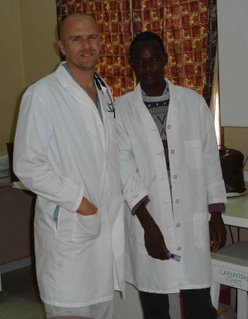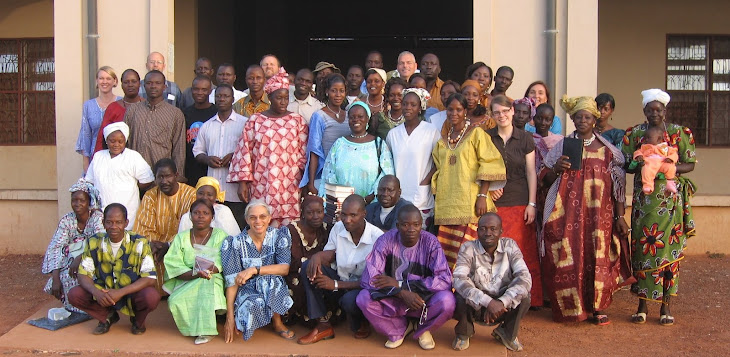 December 6th, 2006
December 6th, 2006This is the coldest time of year in
The hospital is beginning to take on a life of its own. We are doing about 100 deliveries a month now and seeing 50-80 patients in consultation each day. We are doing about 20 surgical cases a month as well. God has blessed us with a wonderful team of Malian and expatriate doctors and nurses. It has been a great joy to watch how we are walking forward together, taking small steps each month, learning and improving our efficiency and our level of care. I am so proud of our little team.
Medical practice here is challenging. There is an enormous amount of infectious disease. Fortunately, most Malian women are as tough as nails. Their resilience in the face of malaria, often profound anemia, and frequent poor nutrition is shocking. Their emotional fortitude in the face of all too frequent infant death is equally amazing.
Last Tuesday a lady presented for consultation being buoyed up by a family member under each arm. They were from an outlying village. She had delivered a premature infant there, 6 days earlier. The infant died at birth, but the placenta never came out. Now, 6 days later, she was massively infected, febrile to 103 F, her pulse was 150 beats/minute, and still bleeding with a hematocrit of 11% ( that is about one fourth of the normal amount of blood cells for an adult) I really couldn’t believe she was even alive. While we were scrambling to get blood for her and to get the operating room ready, a second lady came in pouring blood in active labor with a baby already dead that was positioned sideways in the uterus. Her placenta had prematurely begun to separate from the uterine wall and was causing the hemorrhage, but the baby was locked in her pelvis, unable to descend because of its transverse lie. Her hematocrit was only 14% (equivalent to a hemoglobin of 3.6) and she was actively bleeding all over the delivery room floor. We decided to take her back first, as we only have one operating room. I have never been so proud of our staff. Everyone mobilized. Those who weren’t in the OR helping were over in the lab giving blood or trying to find suitable donors. We don’t have a blood bank, so when transfusions are necessary, we type the family (and our staff) and whoever matches gives a unit on the spot. We do a crossmatch, a rapid HIV test, a hepatitis B test and then just transfuse the whole blood. We really needed an absolute minimum of 4 units for these two ladies. Somehow, they found them and we got two units of blood while we were still in the OR. The surgery went well. 5 days later, she was weak, but walking and eating again.
Then we went back to the OR with the first lady who had the retained placenta for 6 days. She got two units of whole blood on the OR table and we started a curettage to remove the retained dead placenta. Unfortunately, when the uterus is that infected, it doesn’t respond well to medications that would normally help it to contract down and slow the bleeding. We watched the two units of blood that we were running into her arm come pouring back out her uterus when we started the curettage. It gives you the unsettling feeling that you are just sort of changing the oil. Ultimately, we got the placenta out in pieces, but we couldn’t get her to stop bleeding and just ended up packing her uterus full of meters and meters of sterile gauze. Thankfully the pressure from all of the gauze pushing on the walls of the uterus was enough to get the bleeding stopped. She stabilized over the night and we were able to pull all the gauze out the next day without incident. It seems to me that both of these ladies should have died. Often, I feel as though God intervenes here to protect his own reputation because his name is on the sign out front.
Everyday is certainly not as exciting as Tuesday, and all of the outcomes are not always good, but we do see the need to be here and thank God that he is blessing us and inching us forward, though often it seems, in spite of ourselves.
For the many who were praying for the arrival of the hospital shipping container, (the one that left this summer from Ohio- the train that was carrying the container derailed in the desert in Senegal) THANK YOU! We were all delighted when it arrived the week before last moderately disheveled, but 90% intact. No major piece of hospital equipment was irreparably damaged. The container itself was hammered and irrecoverable- so we see God’s hand in protecting all of that stuff!



No comments:
Post a Comment